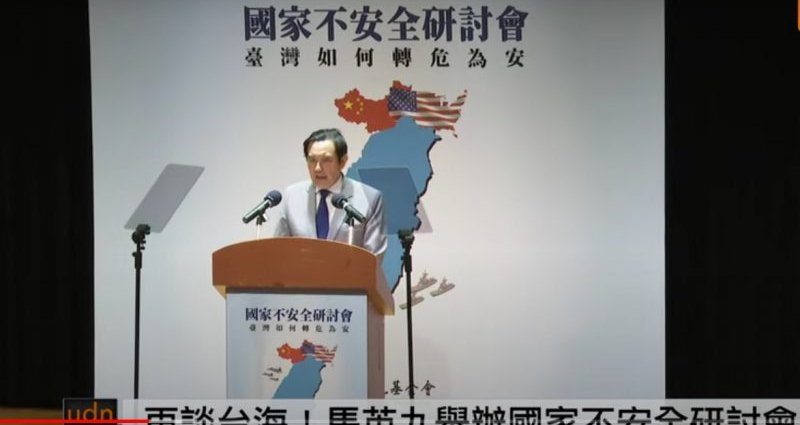In mainland China, however, his ominous words made for a good pro-unification slogan
Former Taiwanese president Ma Ying-jeou claimed the current administration is pushing Taiwan to the brink of war. Screen capture from United Daily News / Youtube.
Amid China’s current military drills in the Taiwan strait, a speech by former Taiwanese president Ma Ying-jeou blaming the current administration for the PRC’s hostility received praise in the mainland — but not so much in Taiwan.
Speaking at a conference in Taipei on August 10, Ma, who is a member of the opposition party Kuomingtang (KMT), claimed Taiwan’s military capabilities are no match for China’s, as well as questioned the United States’ commitment to come help in the case of full aggression. According to him, once China launches a military operation against Taiwan, “the first battle will be the last.”
Ma’s ominous words reverberated among the mainland’s commentariat and social media, with state-supported China Central Television (CCTV) appearing to endorse his view.
Meanwhile, a telephone poll conducted by the Taiwan Public Opinion Foundation on August 17 and 18 found that 58 percent of respondents disagreed with Ma’s views and were “not worried about the outbreak of a war between China and Taiwan.”
Since the beginning of August, China has stepped up its live-fire military drills in the South and East China sea, partly in response to the visit of US Health Secretary Alex Azar to Taiwan.
Azar is the most senior official to visit the island in decades, and his presence there has been condemned by Beijing.
Taiwanese Twitter user Otto Huang said that in his speech, Ma ended up providing China with a “propaganda slogan”:
馬英九 提供給 央視 武統台灣的「口號」https://t.co/uiPPT4UhNP pic.twitter.com/CB4XUfbsXq
— Otto Huang (@OttoHuang120) August 19, 2020
Ma Ying-jeou provides CCTV with a propaganda slogan for unification with Taiwan by force.
Pro-Taiwanese independence groups protested outside the KMT’s headquarters on August 13, demanding the party revoke Ma’s membership:
We cannot accept Ma’s talk of capitulation — and that coming from a former president, who is now a propagandist for China and coerces the Taiwanese to surrender to China without a fight.
But Ma has since doubled-down on his views. On August 22, at another conference, he delivered a second speech, again accusing Tsai of rejecting the 1992 Consensus and criticizing the island’s deepening ties the US. He added:
If Beijing were to use force against Taiwan as a way to push Washington to make concessions, Taiwan would turn from a chess piece to an “abandoned son” and ultimately a sacrifice.
Once again state and party-affiliated outlets in the mainland gave prominence to Ma’s address.
Taiwan has been a de-facto self-ruling state since 1949, when the KMT, then-ruling party of the Republic of China (ROC), was defeated in the Chinese Civil War and established itself on the island.
In 1992, at a time when cross-strait relations had warmed up, Taipei met with Beijing and jointly announced that both countries agreed that they constituted “one China,” in what has since become known as the 1992 Consensus. What that consensus actually means has been up for dispute since then.
The KMT was voted out of power in 2016, with Tsai Ing-wen of the Democratic Progressive Party, a traditional advocate of Taiwanese independence, emerging victorious by a large margin.
In January 2019, Chinese President Xi Jinping announced that China’s interpretation of the “1992 Consensus” was that of “One Country, Two Systems,” a principle applied to the governance of Hong Kong and Macau. Tsai immediately rejected this interpretation. In January 2020, she was re-elected president of Taiwan with over 57 percent of the vote.
Other reactions
Despite the spread of propaganda citing views from Ma’s speeches, there have been a few mainland netizens expressing suspicion of his sincerity. For example, one popular response to a Global Times’ thread on Weibo said:
八年叶未促成中国统一,有何面目大言不惭,五十步笑百步而已,还真是从未见过如此厚颜无耻之人!
Ma was in power for 8 years without enhancing unification and now he has the gut to speak like this. He is no different from Tsai. I have not seen such a shameless person yet.
On another Weibo thread by People’s Daily columnist Xia Ke Dao, a commenter said:
马孃孃的不独不统不武,核心也是以拖待变,岛内主动追求统一的人士日渐凋零
Ma keeps talking about status quo – no independence, no unification, no military operations, it is all about foot-dragging. Less and less people are pursuing unification now.
Meanwhile, reactions in Taiwan have been more direct. Taiwan’s Presidential Office spokesman Alex Huang condemned Ma’s speeches:
In the face of China’s oppression, the nation should not relinquish its sovereignty, democracy or freedom, but rise up against an autocracy by uniting its people in soliciting international support.
And YC Jou, a popular Taiwanese cultural critic, argued on a widely-shared Facebook post that Ma and other speakers at the conference fail to understand Taiwan’s current sentiment on the unification issue:
他們最嚴重的錯誤,就是他們不了解台灣人民的決心。他們和中共一起恐嚇台灣人民這麼多年,他們不知道台灣人民已經受夠了。
更且台灣人民看到香港的情況。不反抗的結果,就是連反抗的機會都沒有。台灣人民的覺悟之深不是他們這種人能夠想像的。
Their most serious mistake is that they don’t understand Taiwanese people’s determination. They have been threatening Taiwanese people for so many years and they don’t know that we have had enough of that.
Now that Taiwanese people have seen what happened to Hong Kong, we know that if we don’t resist now, we will lose our chance to resist. The awakening of Taiwanese people is beyond their imagination.











